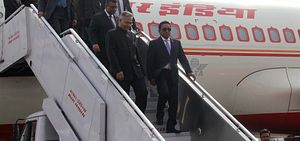The crisis in the Maldives escalated this week after President Abdulla Yameen declared a state of emergency and asked military troops to arrest two top judges and detain former President Maumoon Abdul Gayoom, who has allied himself with the opposition. Last week, the nation’s Supreme Court had ordered the release of nine imprisoned opposition politicians on the grounds that their trials were politically motivated and flawed. The government refused to implement the ruling, which led to widespread demonstrations in Male and clashes between the police and protesters. Calling President Yameen’s announcement as “unconstitutional and illegal,” exiled former Maldivian President Mohamed Nasheed, who was also the country’s first democratically-elected leader, has urged India to “act swiftly” to resolve the crisis.
In some ways, Yameen’s actions are understandable as his options after the Supreme Court ruling were quite limited. The Supreme Court verdict not only paves the way for Nasheed to return back from his exile in Colombo and run for the presidency this year, but also makes the possibility of Yameen’s impeachment plausible. Yameen must be calculating that with help of friends of like China, he would be able to ride over any crisis that might ensue with his declaration of a state of emergency.
The alacrity with which the Maldives embraced China seems to have caught India off guard. But New Delhi’s engagement with Male has been hesitant of late, and China has made the most of it. During Yameen’s China visit last year, the two nations signed twelve pacts, including a free trade agreement. Yameen also fully endorsed China’s ambitious Maritime Silk Road initiative. President Xi Jinping declared that “China deems the Maldives as an important partner” in this initiative and Yameen repaid the favor by claiming that the Maldives viewed China “among [its] closest friends” and that “the Belt and Road Initiative has greatly helped the development of many small and medium countries.” At a time when China’s Belt and Road Initiative is beginning to attract scrutiny around the world, with even erstwhile supporters calling for a reassessment, such an endorsement was much sought after by Beijing.
The Maldives became the second country in South Asia, after Pakistan, to enter into a free trade agreement with China. The Yameen government pushed the FTA through the nation’s Parliament, the Majlis, stealthily, with the opposition not attending the parliamentary session. The principal opposition party, the Maldivian Democratic Party, said that it was “deeply concerned over [the] sudden and rushed Free Trade Agreement with China, without any disclosure of details to the public or to the MPs.” The concerns of the opposition center around a possible increase in the country’s trade deficit, which is already tilted in favor of China, and the strategic direction of the country more broadly. The MDP has argued that it is worried “that further entrenchment of the country into a Chinese debt trap will result in additional stress on strategic national assets and increasing instability in the Indian Ocean region.”
But that is where Yameen wants to take his country it seems. On the one hand, he has been flirting with Islamist extremism and, on the other, he wants to use closer ties with China to shield his government from global criticism. After the first visit by a Chinese president to the Maldives in 2014, it officially became a part of the 21st-century Maritime Silk Road. China quickly expanded its economic profile in the Maldives by building mega infrastructure projects, including the development of Hulhule island and a bridge connecting it to Male as well as the country’s main international airport. A constitutional amendment allowing foreign ownership of freehold land was passed in 2015, which can potentially enhance China’s military presence on the island nation. Already, Chinese naval ships have become regular visitors to Male.
During his 2016 visit to Delhi, Yameen said his country pursues an “India first” foreign policy, describing it as the Maldives’ most important friend. But that was just after India had shielded the Yameen government from punitive action by the Commonwealth’s human rights and democracy oversight body. New Delhi’s recent policy of engaging with the Maldivian opposition, especially the former president, Nasheed, may be causing heartburn in Male and so the outreach to China has intensified. The Maldives remains the only country in South Asia that Indian Prime Minister Narendra Modi is yet to visit.
There were many in India who have been critical of the Modi government’s light touch approach toward Yameen over the last few years, especially as he systematically worked at destroying the foundations of democracy in his country. But New Delhi had other interests to preserve in the archipelago nation. Now the moment of reckoning has come for both for New Delhi and Yameen. India’s suggestion that the Supreme Court’s ruling should be promptly implemented was clearly given a short shrift by Yameen. New Delhi will have to intervene cautiously. A coordinated response with other like-minded regional and extra regional players will be the first step. But like in the past, New Delhi should not be shy of using coercive diplomacy if only to underscore that ignoring India’s warnings comes at a price. The logic of geography dictates that India’s role will be critical in determining the trajectory of political developments in the Maldives.

































